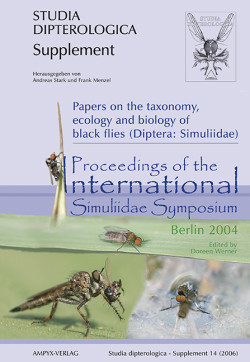Seebener Str. 190, 06114 Halle, Deutschland
E-Mail:stark@ampyx-verlag.de, Internet: www.ampyx-verlag.de
Telefon: (0345) 5226726. Für Anfragen zwischen 8 und 17 Uhr: (0151) 70143999
Fax: (0345) 2398813

AMPYX-VERLAG Dr. Andreas Stark
Seebener Str. 190
06114 Halle/Saale
Wissenschaftlicher Fachverlag
Telefon: (0345) 5226726 und (0151) 70143999
Papers of the taxonomy, ecology and biology of black flies (Diptera: Simuliidae) - Proceedings of the International Simuliidae Symposium Berlin 2004
Studia dipterologica. Supplement Band 14

Download:
Black Flies_Leseprobe (*.pdf-Datei, 2 MB)
| Autor | Doreen Werner |
|---|---|
| Band | 14 |
| Auflage | 1. |
| ISBN-13 | 978-3-932795-23-7 |
| Erscheinungsdatum | 27.02.2006 |
| Seitenanzahl | 143 |
| Produktform | Paperback |
| Maße & Gewicht | 24cm x 17cm, 350g |
| Sprache | Englisch |
| Gebundener Ladenpreis (zzgl. Versand) | 45,00 Euro (DE), 46,30 Euro (AT) |
| Lieferbarkeitsstatus | lieferbar |
Summary
Black flies (Diptera, Simuliidae) are small but rather robust flies, well known for the specialised feeding habits of the females. The preimaginal stages are always associated with running water and may be found in flows ranging from tiny trickles to large rivers. As filter feeders, the larvae play a key role in river and stream ecology and are important members of the food web.
In many regions of the world, particular environmental factors have giben rise to mass emergences of adult black flies, and the females of many species then actively seek a bloodmeal. Bloodsucking females are important pests and are vectors of disease organisms in humans and in both domestic and wild animals. Worldwide, they are directly responsible for serious economic losses and even deaths among cattle. Within the context of medical and economic zoology, the Simuliidae are one of the best-studied groups of lotic insects. Adult black flies are able to transmit filarioid worms and blood protozoans to a wide range of vertebrates. In parts o the tropics, they are responsible for the transmission of Onchocerca volvulus, and onchocerciasis or "river blindness" is recognized as a major endemic desease, mainly in Africa and Central and South America.
Based on their medical and veterinary importance, black flies require increased scientific research, for example in the areas of morphological taxonomy, systematics, freshwater ecology, molecular biology, cytogenetics, parasitology, immunology, epidemiology, and pest management.
In 2004, the Simuliidae working groups of Central Europe and Great Britain met together to take part in a International Simuliidae Symposium, held from 15 to 18 September at the Humboldt-Universität zu Berlin, Germany. With 38 delegates from 16 countries (Austria, Belgium, Canada, Czech Republic, Finland, France, Germany, Great Britain, Italy, Lithuania, Norway, Serbia-Montenegro, Russia, Slovakia, Sweden, USA), this was the largest European meeting of its kind to be held. In total, 35 scientific presentations were given, with the emphasis predominantly on taxonomy and systematics, history, ecology, transmission of desease agents, medical and veterinary aspects, and control. The major part of lectures held in the symposium is presented in this current issue of the Supplementum series of Studia dipterologica.